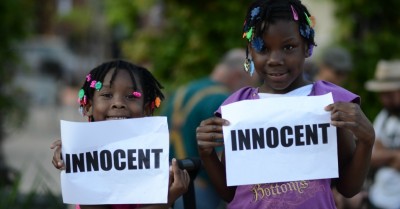Cruel and Inhuman: UN Slams US as Only Nation that Sentences Children to Die In Prison
Special Rapporteur Juan Méndez notes US policy violates international human rights law

Image from action in Oakland, California highlighting injustice in the prison industrial complex in April 2012. (Photo: Daniel Arauz/flickr/cc)
A United Nations human rights expert strongly condemned the U.S. on Tuesday for being the “only State in the world that still sentences children to life imprisonment without the opportunity for parole,” thereby imposing cruel, inhuman, and degrading punishment.
Juan Méndez, the Special Rapporteur on torture, made the comments in a report to the UN Human Rights Council in Geneva—building from his previous censure of cruel incarceration practices in a nation that locks up more people than any other country in the world.
Méndez noted that the U.S. practice of imposing life sentences on children in cases of homicide violates international law on numerous fronts, including the Convention on the Rights of the Child.
“Life sentences or sentences of an extreme length have a disproportionate impact on children and cause physical and psychological harm that amounts to cruel, inhuman or degrading punishment,” he wrote.
Such prison sentences are widespread.
Approximately 2,500 people in the U.S. are currently serving life sentences without parole for crimes allegedly committed as juveniles, the Sentencing Project finds (pdf).
These sentences reflect—and reinforce—racial disparities in U.S. society. “White juvenile offenders with African-American victims are only about half as likely (3.6%) to receive a [juvenile life without parole] sentence as their proportion of arrests for killing an African-American (6.4%),” the Sentencing Project notes.
However, the injustices do not stop there.
Méndez blasted another policy that is rampant in U.S. jails and prisons: holding people under the age of 18 in solitary confinement.
“In accordance with views of the Committee against Torture, the Subcommittee on Prevention of Torture and the Committee on the Rights of the Child,” wrote Méndez, “the Special Rapporteur is of the view that the imposition of solitary confinement, of any duration, on children constitutes cruel, inhuman or degrading treatment or punishment or even torture.”
Méndez’s statements follow his previous call for a ban of all long-term solitary confinement—of any person, at any age—which he has described as torture. Méndez has repeatedly expressed concern about the rampant imposition of long-term solitary confinement in U.S. prisons, particularly in California, which has seen repeated prisoner hunger strikes over this and other abusive practices.
Mohamed Shehk, communications director for Critical Resistance, told Common Dreamsthat the Special Rapporteur’s latest report highlights “just one aspect of a system that continues to lock up people and destroy communities.”
“Of course life without parole for children should be abolished,” said Shehk. “Life without parole for anyone should be abolished. This is a system that throws people away in prisons and jails and completely ignores any kind of global call to end that practice, even though it completely contradicts international law—which the U.S. claims to hold so dearly.”

